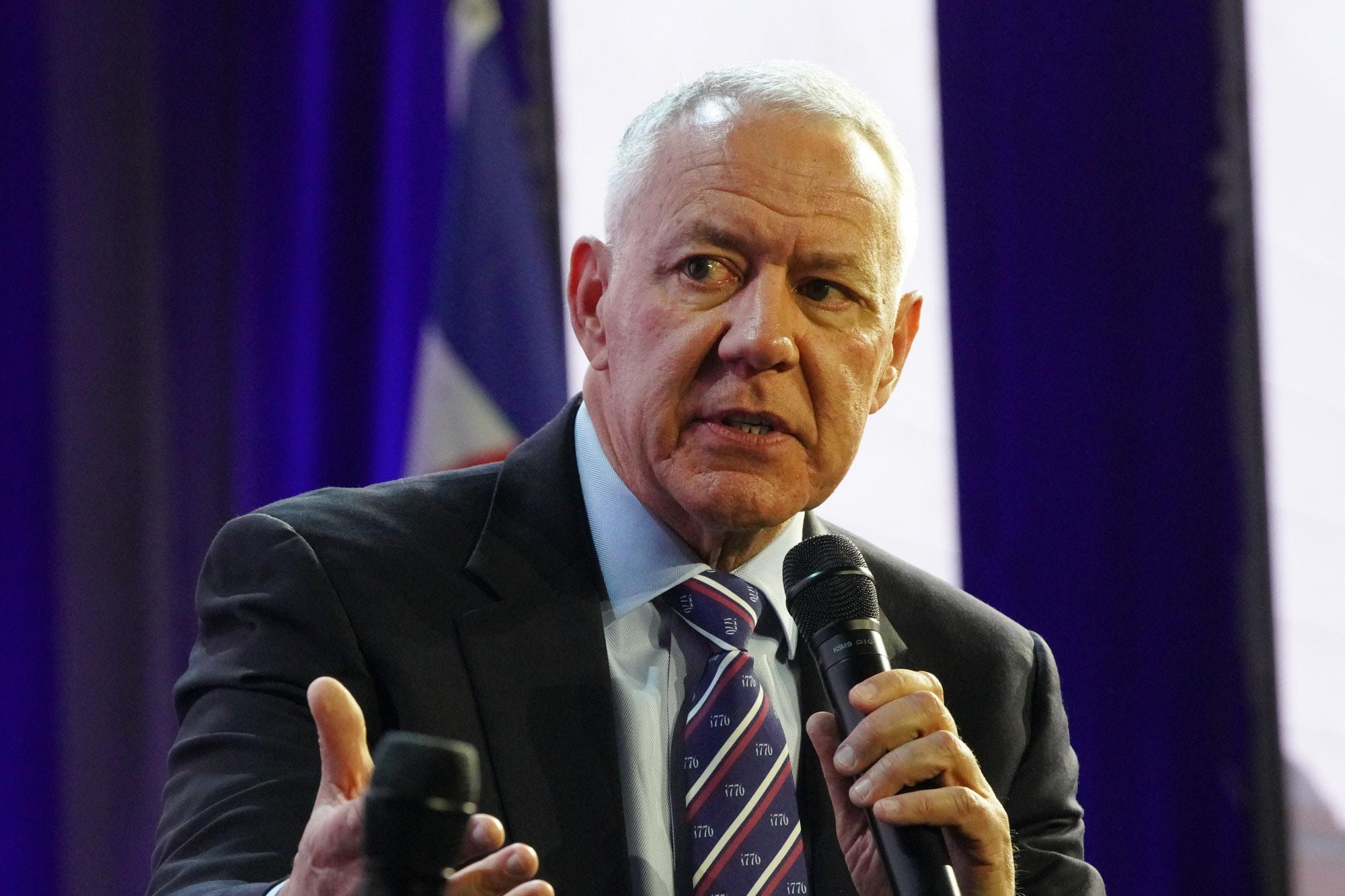
Free-market conservative Rep. Ken Buck might seem like an unlikely champion to take on Big Tech. But it's an issue the Colorado Republican has been leading on in Washington, D.C., a crusade that now includes his new book: "Crushed: Big Tech’s War on Free Speech."
Buck was originally skeptical about the need for government intervention in big tech’s practices; he recalls being grumpy about having to attend a 2020 congressional field hearing on competitors in the digital Markets — and not just because it was a very cold day and the hearing was taking place in liberal Boulder County.
As the only Republican member of the antitrust subcommittee to attend, along with Democratic Chair David Cicilline and fellow Coloradan vice-chair Rep. Joe Neguse, Buck thought he’d “feel even more like the odd man out.”
“I went into that hearing thinking that the free market would address the issues that we were facing in this area,” Buck told CPR News. “And I left recognizing that there isn't a free market, that these monopolies have dominated the marketplace and are acting in an anti-competitive way to continue to dominate the marketplace.”
A crusader was born.
In the years since, Buck has worked on numerous pieces of antitrust legislation, with varying degrees of success. Last year's package of bills focused on anti-competitive practices by the largest tech companies: Apple, Amazon, Meta (Facebook’s parent company), Alphabet (Google), and possibly Microsoft. It was inspired by what lawmakers learned in hearings and the reports they wrote, one from the majority, as well as a separate report that Buck penned. (GOP Rep. Jim Jordan, ranking member of the Judiciary Committee, filed a dissenting view to the majority report.)
He writes this issue has “energized his purpose for being in Congress.”
The 2022 legislation aimed to address issues from Amazon boosting its own sellers over independent vendors to a local paper taking on Google and Facebook over advertising, and even preferential deals between big tech companies, like Apple making Google the default browser on the iPhone.
“Google has such a dominant position in digital advertising that it is dangerous, it is incredibly inefficient in the marketplace. People are being overcharged,” Buck noted as one example.
The Justice Department and eight states, including Colorado, filed suit against Google last month over its ad practices. Texas led a similar lawsuit in 2020.
In this Congress, Buck is leading the charge in the House on an ad tech bill, with GOP Sen. Mike Lee taking the lead in the other chamber. It would restore and protect competition in digital advertising.
'Crushed' goes over his concerns with Big Tech
But as the title of his book indicates, Buck's concerns with the industry go beyond business practices. He also wants to take on an issue near and dear to many conservative hearts: Big Tech supposedly suppressing free speech. And he argues the two — control of the digital marketplace and restrictions on free expression — are related.
“Let's talk about Apple,” he explained. “They had an app on their app store called HK Map that the protesters in Hong Kong used to avoid the police and to be able to protest without being arrested or beaten.”
But Buck points out Apple removed the app after China objected.
“Apple was willing to go along with the Chinese Communist Party and remove an app that allowed people to express themselves without being arrested, without harassment. So there's a clear link between what Apple does and speech,” he concluded.
In his book, Buck uses many other examples from closer to home that conservatives can relate to regarding free speech, such as the right-wing social media app Parler’s removal from app stores in the wake of the January 6th attack on the Capitol. It was allowed back after the company made changes to its content moderation policy.
“How would you feel if you were a newspaper reporter and someone came in and moderated our discussion? How would you feel if you were on cable news and somebody came in and moderated our discussion?” Buck asked during his interview with CPR. “Moderating is just censoring. The Left doesn't like to use the term censoring, but it's exactly what it is.”
However, media outlets, including CPR, do have editors, whose job is to essentially moderate reporters’ content, something Buck does acknowledge in his book.
Still Buck argues a handful of companies should not have a monopoly on disseminating information.
“I can watch a cable news show, and I can be deeply offended and I can switch channels and I can watch another cable news show and I agree with it,” Buck said. “We have a variety of sources. And so if we have a variety of Facebooks, if we have a variety of Googles, I think we are a much healthier country.”
And if that means there’s false information out there, well, he believes, “buyer beware.”
Buck also offers suggestions for what individuals can do to loosen the grip Big Tech has on our digital lives, like turning off your phone’s tracking so companies don’t know what you’re buying or searching for. He said, “these companies would go crazy because a big part of their advertising appeal is that they know where people are going. They know what people are buying, they know what people are searching for.”
He has even tried to conduct his own, one-man boycott of the Big Four tech giants.
Will the book help Buck's cause on the Hill?
Buck also hopes this book will build support — on and off Capitol Hill — for the bipartisan antitrust bills he thinks get at the heart of the problem. He knows it’s an uphill battle, though, with Big Tech companies throwing their considerable lobbying power against the bills.
Only a few of the bills in last year’s package passed, and Buck blames Democratic leaders for not bringing the rest to the floor, although Republican leaders didn't support them either. Just as there was bipartisan support for the reforms, there was also bipartisan opposition among rank-and-file members, too.
As for whether his work will fare differently in the new Republican-controlled House, “Let's talk in two years, and if nothing hits the floor under [GOP House Speaker] Kevin McCarthy, then, you know, we've got a conversation,” he said.
Even as Buck has been talking up his ideas with GOP freshmen and handing out his book to colleagues. There are signs that Republican House leadership wants to go in a different direction when it comes to Big Tech. Buck was the ranking member of the antitrust subcommittee last congress, but was passed over for the chair now that Republicans are in control, in favor of a member who voted against the antitrust measures Buck has backed.









